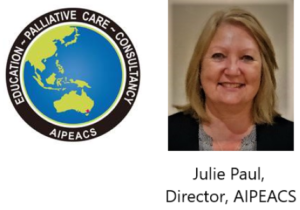
-
日本語訳 監修 木下佳代子 ジェックス参与
今月は、愛する人が死にかけている家族の看護をする際の、自分が行った看護の満足度について考えてみたいと思います。
死が迫っている患者さんの看護に満足していないと、その家族や愛する人の看護もうまくいかないでしょう。
愛する人が亡くなりかけているときに、どのように家族を看護し、コミュニケーションをとるかが、その家族の死別の悲しみや将来の死生観に影響を与えることが研究で証明されています。
家族を看護するためには、看護の焦点が治療ではなく、安心感や生活の質であることをケアするチームが「認識」することが重要です。チームは、患者さんが「死」に近づいていることを「認識」できなければなりません。この重要な看護の2つの要素としては、1)家族に情報を提供し、2)数日後、数週間後に何が起こるかについて話し合いに家族も参加してもらうこと、が大切です。
このような話し合いが行われなければ、家族は適切な看護を受けることができません。
今回のコーナーは、急性期の入院で亡くなった患者さんの話ではなく、慢性疾患や癌の患者さんの話をしていることを覚えておいてください。
あなたの看護で亡くなった最後の患者さんのことを振り返ってみてください。
・チーム内で、その人の死が迫っていることは明らかになっていましたか?
・家族をサポートしたことに、どのように満足していますか?
・チームの全員が同じ目標に向かっていましたか?
ケアプランは、患者さんが亡くなりかけていることが考慮され、患者さんとご家族のために適切なプランが用意されていましたか?
◆以下の項目について、家族と話し合いましたか:
①特に最後の数日間、患者さんの状態が悪化したときにどんなことが起こるか、通常の死のプロセスについて具体的に家族と話し合いましたか。
②患者さんだけでなく家族にも寄り添った対応をして、安心させることができましたか。
③家族に、何か心配事があれば、何でも相談してほしいことや、どんなことでも質問するように励ましましたか。
④家族が十分な水分と栄養を摂取できるように配慮しましたか。
⑤死が迫っている患者さんと一緒に長時間座っている間、家族が快適に過ごせるように配慮しましたか(病院や高齢者施設でできる範囲で)。
⑥死が近づいているときの患者さんの変化、例えば、チェーンストークス呼吸についての説明や、それが何を示すのかについて家族に伝え続けましたか。 “死前喘鳴 “とはどういうものか、これによって患者さんは苦しんでいないということを十分に説明しましたか。
⑦聴覚は最後まで残っている感覚であり、臨終のときに必要なだけ声をかけることが大切であるということを家族に伝えましたか。
◆その患者さんが亡くなった後のことを、さらに振り返っていただきたいと思います。 その患者さんが亡くなった後、家族をどのようにサポートしましたか?
①家族に、ご本人はもう安らかに眠っているので、今は何もしなくてもよいということを伝え、ご家族は大丈夫かどうかを確認しましたか?
②患者さんが亡くなったことを確認する際に、看護師がすべきことを家族に説明しましたか? このケアが完了するまで、ご家族に部屋にいてもらうか、ご希望であれば静かな場所でお茶を飲みながら座って待ってもらうように配慮しましたか?
③家族が必要とする限り、できるだけ亡くなった方のそばに一緒にいるように勧めましたか?
④エンゼルケアをすることが、家族にとって大事なことであるなら、一緒にしてもらうように声をかけましたか。
⑤家族に代わって誰かに電話をかけることを申し出ましたか?
⑥葬儀の準備など、これから何をしなければならないか、家族に確認しましたか?
ここでは、大切な人が亡くなったときに家族を看護するための重要な側面をほんの少しだけ紹介しました。 今月のコーナーの目的は、私たちがこの種のケアをどれだけ満足して提供できるかを振り返ることです。 もしこの分野で何か欠けているところがあれば、それに対処するのは私たち次第です。また、少なくとも、あなたがこの看護を行えないときには、他のチームのメンバーがこの看護を提供できるようにしなければなりません。 あなたの看護と配慮に、家族は永遠に感謝するでしょう。
冒頭で述べたように、大切な人が亡くなったときに、どのように家族に配慮し、コミュニケーションをとるかが、その家族の死別の悲しみや死生観に影響を与えることは、研究や私たちの実践で証明されています。
患者さんの死は一度きりなので、私たちはその時に提供できる最高の看護を行う必要があります。
もし、追加の情報を希望される分野があれば、julie@palliativeeducation.com までご連絡ください(英語でも日本語でも可)。 緩和ケアに関する皆様のご意見やご経験を共有することで、お互いに学び合うことができますので、皆様の状況をお聞かせください。
パンデミックの間、どうか安全にお過ごしください。 来月の報告を楽しみにしています。
ごきげんよう、ジュリー
- [事務局より]
-
直接、ジュリーさんにメールを出しにくい場合は、遠慮なくジェックス事務局(nurse@jeccs.org ) まで、日本語でご連絡ください。感想、質問などをお待ちしています。
- Disclaimer: June 2021 免責条項:
- Australian International Palliative Education and Consultancy Services (AIPEACS) は、Julie’s Corner シリーズ内の内容につき正確な情報の提供に細心の注意を注いでいますが、特にある事柄についての専門的意見を提供するものではありません。このシリーズに含まれる情報は、独立した専門家の見解に取って代るものではありません。また、医療上の助言として利用したり、何らかの疾患の治療、手当、又は、予防のために使用されるものではありません。
- AIPEACSは、このシリーズにより提供される情報の利用、依存によるいかなる法的責任、怪我、紛失、損害については、責任は負いません
- Australian International Palliative Education and Consultancy Services Pty. Ltd
Julie’s Corner: June 2021 (原文)
This month I would like us to reflect on our own personal comfort levels, when caring for families, when their loved one is dying.
If we are not comfortable with caring for dying patients, then we are unlikely to do well in caring for families and loved ones.
Research has proven how we care and communicate with families when a loved one is dying will impact on their bereavement and their perception of death and dying in the future.
To be able to care for families it is important the team are able to “recognise” when the focus of care is now on comfort and quality of life, not cure. The team need to be able to “recognise” when the person is “dying”. It is important at these two pivotal components of care that families are informed and involved in the discussions of what to expect over the next few days or weeks. Without these types of discussions families will not be able to be cared for appropriately. Remember in this update we are not talking about patients who die from an acute admission we are talking about patients with chronic illness or cancer.
Reflect on the last patient who died in your care. Was it clear within the team that the person was dying? How comfortable were you in supporting the family? Were all of the team focussed on the same goals? Did the care plan reflect that the patient was dying and an appropriate plan in place for the patient and the family?
Were the following areas discussed with the family:
- -What to expect as the person deteriorates especially those last few days. Specifically, was normal dying process discussed with the family?
- -Did you reassure the family that you were there for the patient and them as well
- -Did you encourage the family to ask any questions they may have, reassuring them that if they are concerned about something, then you would want to know
- -Did you ensure the family had adequate hydration and nutrition
- -Did you ensure they were comfortable (as is possible in a hospital / aged care facility) whilst they were sitting for long periods, with the person who was dying
- -Did you continue to inform the family of any changes in the patient as they were nearing death. For example, an explanation of cheyne stoke breathing and what this may indicate. Did someone explain the concept of “death rattles” to ensure that they did not think that the person was in distress
- -Did we inform the family that hearing was the last sense to go and that it was important that they continue to talk to the dying person as much as they needed to
I am interested for you to reflect further on what happened after the person died. How did you support the family after the person died?
- -Did you inform the family that the person was now at rest and there was no urgency now to do anything and you wanted to make sure they were okay
- When confirming the person had died, did you explain to the family first what you were required to do. Did you offer them to stay in the room or if they preferred finding a quiet place for them to sit with a couple of tea whilst this task was completed
- -Did you encourage the family to be with the person who had died as long as they needed?
- -Did you offer them to assist you in washing the deceased person if that was important for them
- -Did you offer to ring anyone on their behalf?
- -Did you check in with the family that they knew what they had to do now, eg; funeral arrangements etc.
We have only skimmed over the important aspects of caring for families when a loved one is dying. The purpose of this month’s update is to reflect how comfortable we are in providing this type of care. If we have any gaps in this area it is up to us to address these areas, or at a minimum ensure a member of the team is able to provide this care when you are unable to do this. Families will be forever grateful for your care and thoughtfulness.
As we said at the start research and our practice has proven how we care and communicate with families when a loved one is dying will impact on their bereavement and their perception of death and dying in the future.
Patients only die once so we need to ensure our care is the best we can provide at this time.
If you have any particular areas you would like additional information on, please forward your request (either in English or Japanese) to julie@palliativeeducation.com and we will ensure this is discussed. Don’t forget to let me know how you are going, as we enjoy sharing your thoughts and experiences in palliative care, so we can continue to learn from each other.
Please stay safe during the pandemic. I am looking forward to our next month’s catch up.
Take care Julie
